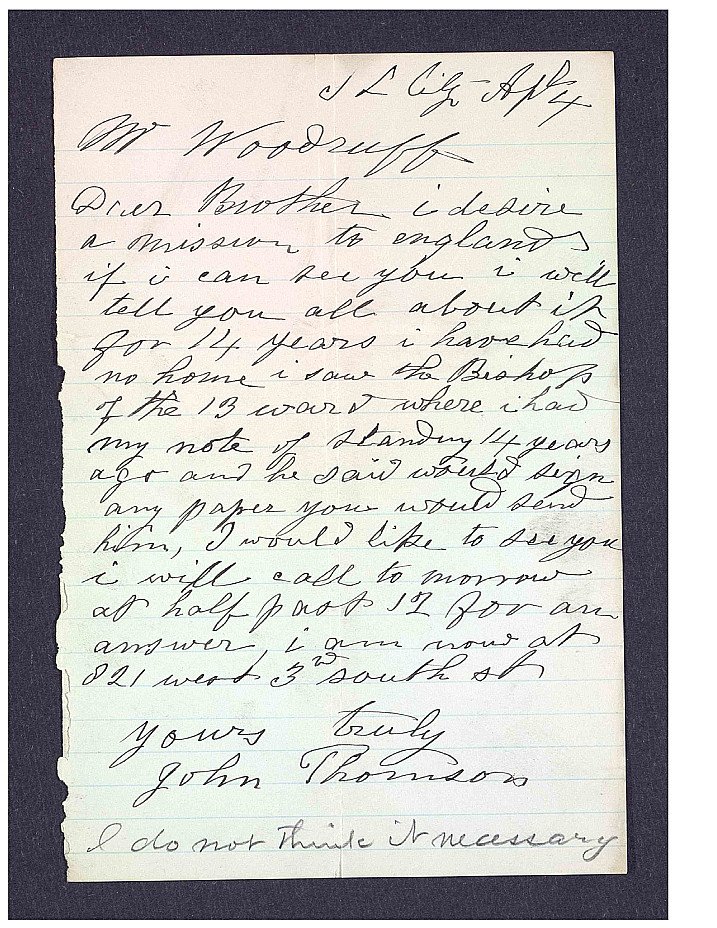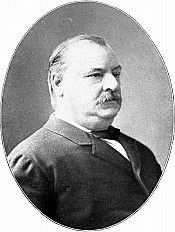THE DESERET WEEKLY.
PRESIDENT WILFORD WOODRUFF
Said he felt to thank God his Heaven-
ly Father that he had the privilege
this day of standing in the midst of
such a vast congregation in the house
of israel. He also thanked the 10,000
Latter-day Saints whose prayers had
ascended to the Lord in his behalf. By
the power of God and their prayers
he has been preserved until the
present hour. While he did not feel
capable of answering his own thoughts
in reflecting upon the scenes through
which the Latter-day Saints as a
people had passed in the years which
were gone, still he assured his hearers
that his heart was full of blessing and
thankfullness towards his brethren and
sisters, and all men who had desired to
do what was right.
This was a day to which he had
looked forward for many years, and
when he reflected upon the hundreds
and thousands of Elders of Israel, and
the Prophets and Apostles with whom
he had been associated, many of whom
had already passed to the other side of
the vail, he marveled at the work which
had thus far been accomplished and
that his own life had been preserved so
long in the midst of this people.
As Latter-day Saints they had great
reason for rejoicing before the Lord,
and their hearts should be filled with
gratitude and thanksgiving unto the
Most High for the many blessings
vouchsafed unto them.
When he took a retrospect of their
position and saw what had been ac-
complished through God's mercy, by
this people, since they arrived in these
valleys on the 24th of July, 1847, it
was to him a marvel and a wonder.
Though many of their brethren—
President Brigham Young, who had
led them here, and others who were
formerly associated with them in this
great latter-day work, had passed away
—yet he believed that in the spirit
world today they were deeply inter-
ested and rejoicing in the work in
which the Latter-day Saints were
engaged on this special occasion.
They were expecting (continued
President Woodruff) by the blessing of
God to enter, in a few days hence, the
Temple which had been reared here in
the name of the Lord, by His people;
and he desired in the short time now
at his disposal to bless every Latter-day
Saint from the bottom of his heart for
what they had done towards the
achievement of this grand object. No
call, he believed, had ever been made
upon any people upon the face of the
earth which had met with such a
hearty and universal response as that
for means to finish the Salt Lake Tem-
ple. He felt to thank the Lord for the
spirit which had been manifested by
the Saints in this respect.
They had erected three temples be-
fore this one in these mountain valleys.
The Elders of Israel had labored un-
ceasingly to attend to the ordinances of
the house of God, both for the living
and the dead; because he need hardly
tell the Latter-day Saints that these
holy temples had been erected for the
redemption of the dead as well as
blessing the living.
The Prophet Joseph Smith laid the
foundation of this Church and King-
dom and revealed those principles
unto us; but no principle had ever been
reve[a]led from God to man which had
given the Latter-day Saints more joy
and consolation than the revelations
whereby the Lord had fulfilled the
prophecy of one of the ancient
prophets, who said that in the last
days He would raise up saviors upon
Mount Zion, while the Kingdom was
the Lord's. That day had come.
He himself well remembered the
time when that revelation was given
—the feeling which thrilled their
hearts and souls when they realized
that in their day and generation they
had the power to go forth and attend
to these ordinances for their dead
progenitors, the same as for those who
were still living in the flesh. They
did not hesitate, as soon as that revela-
tion came, to make a commencement
of this Temple work, and there
were scores of men around him
today who had labored for years
in these temples in this way. He
greatly rejoiced at the thought that
when he himself entered the spirit
world he would meet those of his pro-
genitors who, perhaps, had never
heard the true Gospel, who never saw
a prophet, apostle, or other inspired
man while in the flesh; and as Jesus
went and "preached to the spirits in
prison" in His day, so would those
men who now lived and held the keys
of the Priesthood when they passed
behind the veil also preach to "spirits
in prison," open the prison doors and
let the prisoners free. In all his labors
in the cause of this Gospel, for some
sixty years, there was no kind
of work which he had per-
formed with greater satisfaction than
that of redemption for his dead.
Who could not, indeed, rejoice before
the Lord when he contemplated
the future of this great work in the
Rocky Mountains and the privileges
which they enjoyed?
He was thankful the day had come
when they had the opportunity of
dedicating this Temple unto the Lord,
and into which the vast number of
people who dwell in this region of
country would be able to enter and
perform the ordinances required of
them without having to travel long
distances, as had been the case
hitherto.
He had seen some serious
times in the history of this
Church—at Kirtland for instance;
but when he first heard Joseph
Smith preach he knew that he was a
Prophet of God. Of that he then had
all the testimony he needed. The
Prophet Joseph, however, had labored
in the cause of this Church and King-
dom about fourteen years only from
the time of his ordination until he was
martyred. He nevertheless performed
a great mission.
At his own advanced age he thanked
God that he was surrounded by a
quorum of Apostles among whom
there existed such a spirit of unity;
they were united as the heart of one
man. He firmly believed that any
one of them would die for him if
needs be, and he would do the
same for either of them should the
Lord require it at his hands.
There was a love between all of them
that the world knew not of—a love
which distinguished all men who bore
the Priesthood from the rest of the
world.
The Lord had always chosen the
weak things of the earth to confound
the wise, as He had promised; and this
was a principle which he (the speaker)
had thought much about from his boy-
hood. His own view was that the Lord
had done this because He desired to
choose an element which He could
handle and make use of. Many of the
Apostles of old were poor fishermen,
but they were ready to yield up their
lives for the Gospel's sake, without any
regard whatever for the honors of the
world.
So in our own day and generation.
Joseph Smith was called an ignorant,
illiterate boy. In some respects he
might have been, as the world under-
stood it; but he was ordained, before
the foundation of the world, to lay the
foundation of the Church and King-
dom of God. Had not this been God's
work, and had it not been sustained
by His power from the very begin-
ning? In proof of this the speaker
instanced the remarkable gathering of
the Saints to these mountains and
their wonderful preservation through
persecution and trial. As with
Joseph Smith, he said, so with
Presidents Brigham Young and






